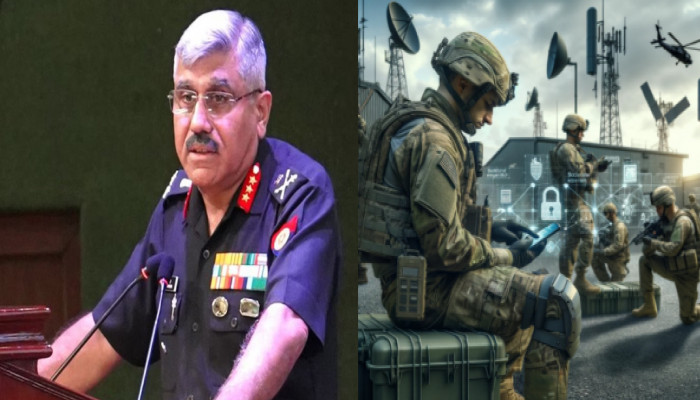Indian army launches internship program to tap into young talent for emerging technologies
- In Reports
- 02:38 PM, Nov 23, 2024
- Myind Staff
The Indian Army is launching an internship program to attract young, tech-savvy individuals to explore how new technologies can be used in military operations. This is part of the Army's larger plan to keep up with global technological changes, especially in fields like cyber security, IT, and information warfare. As warfare shifts towards non-physical strategies, the Army aims to train the next generation to lead in this changing environment.
The Indian Army's recruitment efforts now include not only domain specialists but also interns, giving them the opportunity to work directly with cutting-edge technologies used by the military, Lt General Rakesh Kapoor, Deputy Chief of Staff (Information Systems and Communication), told the media on Friday. In order to stay up with the evolving nature of warfare, Lt Gen Kapoor announced that 2024–25 will be the Army’s “Technology Absorption Year.” This underscores the significance of swiftly integrating new technical capabilities.
The Indian Army is realising the necessity to hire specialists in areas like cyber security, artificial intelligence (AI), machine learning (ML), and quantum computing as a result of the growth of cyber warfare and digital tactics.
The crisis in Ukraine has demonstrated the importance of non-contact tactics of warfare, such as cyberattacks and digital manipulation, in contemporary conflicts, as Lt. Gen. Kapoor noted. The Army has had to reconsider how it hires and develops troops who can use these technologies due to the change in warfare. Recruitment is currently open for both the Territorial Army (TA) and the Regular Army, focusing on specialists in the cyber and IT fields. For officer positions, candidates need a postgraduate degree, while Junior Commissioned Officers (JCOs) must have at least a graduate degree. Successful candidates will have the chance to grow and advance based on their performance, ensuring that the Army attracts top talent.
He discussed how the Army needs to be up to date with quickly evolving technology in order to stay competitive. According to him, military operations and technology have a "mutual growth" connection in which both inform and improve the other, enabling the Army to operate more effectively in a setting that is becoming more and more tech-driven. The Army has started a new internship program as part of the Prime Minister's Internship Mission. This program offers university students and young professionals a chance to work with different Army departments, such as cyber security, AI research, and innovation teams. Interns will also have the opportunity to contribute to projects related to the Army’s UN Peacekeeping Program and the Center for Land Warfare Studies.
This initiative aims to give young people a chance to learn about military operations and spark interest in careers in defence technology. Interns will get hands-on experience in important technology areas like AI, cyber security, 5G, blockchain, robotics, and other new fields. The goal is to inspire the next generation of leaders in defence technology by allowing them to work on some of the Army's most advanced projects. The Indian Army's efforts to bring in tech experts and young interns are similar to what other advanced militaries around the world are doing. For instance, the U.S. Department of Defence has long seen the value of including civilian experts, especially in areas like cyber security and AI, through programs like the Defence Innovation Unit (DIU). Likewise, Israel, which is known for its strong cyber defence skills, constantly hires specialists in digital warfare to stay ahead in technology.
The Indian Army is making sure it is prepared to face the difficulties of future combat by enlisting young talent and using the tech community. This program gives participants a great chance to investigate how technology and defence policy interact, preparing them for positions that may influence the Army's future.







Comments